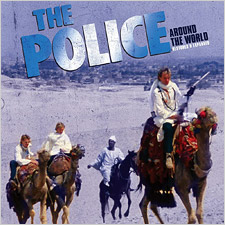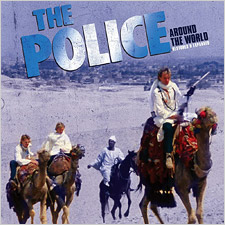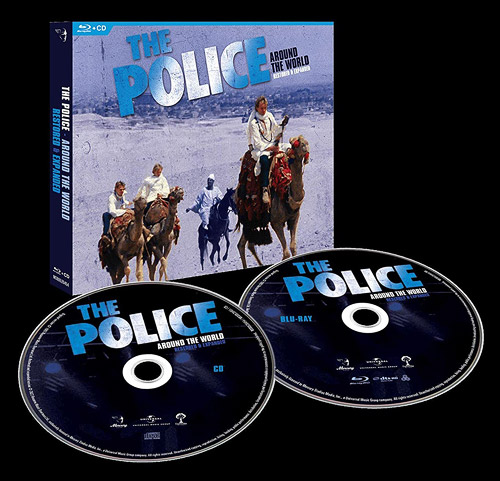Police, The: Around the World – Restored & Expanded (Blu-ray + CD Review)

Director
Kate and Derek BurbidgeRelease Date(s)
1983 (May 20, 2022)Studio(s)
A&M Records/Roxanne Music Ltd. (Mercury Studios)- Film/Program Grade: B+
- Video Grade: B+
- Audio Grade: A+
- Extras Grade: B
Review
Though they became one of the decade’s biggest bands, The Police were an unlikely success story in the early 1980s. Lead singer Sting (aka Gordon Matthew Thomas Sumner) began his professional career as a teacher at St Paul’s First School in Cramlington, Northumberland, England, moonlighting at night as a bass player for a jazz-rock fusion band called Last Exit (with brief detours in the Phoenix Jazzmen and Newcastle Big Band). And drummer Stewart Copeland was an American ex-pat who’d grown up in Beirut (his father Miles was a founding member of the OSS and CIA), where he discovered a love of rhythm and percussion that led him to become a member of the British prog rock band Curved Air. The pair met in Newcastle in 1976 and quickly struck up a friendship. So Stewart invited Sting to London, where—at the time—punk rock was all the rage. Ever the opportunist, Stewart immediately formed his own punk band and roped Sting and a Corsican guitarist named Henry Padovani into it. The Police, as they were known, played their first gig on 1 March 1977, a 10-minute set at Alexander’s in Newport, Wales. But they soon discovered a problem: While Sting and Stewart were experienced musicians, Padovani was not.
A solution presented itself three months later, when former Gong musician Mike Howlett recruited Sting to participate in a one-off performance in Paris called Strontium 90. Howlett needed a drummer, so Stewart tagged along, but he’d already found a guitarist. Enter Andy Summers, who—fully a decade older that Sting and Stewart—had enjoyed modest commercial success playing R&B (with Zoot Money’s Big Roll Band and Eric Burdon and the Animals), acid rock (with Dantalian’s Chariot), and prog (with Soft Machine). After performing and recording together with Howlett (recordings that can be heard here, from an album called Strontium 90: Police Academy), Andy was quickly invited to join The Police. But he had one condition: The band should remain a three-piece, and Padovani was the odd man out. The Police played their first fully-formed gig on 18 August 1977, infusing their brand of “punk” with jazz, progressive, and particularly reggae, and began touring aggressively while they wrote enough material to record an album. But these were lean times for the band, so they took side jobs starring in TV commercials in London. One of these, a Wrigley’s chewing gum advert directed by Tony Scott (The Hunger, Top Gun) in February 1978, required the band to dye their hair blond. The ad itself was shelved before airing (and sadly does not appear to survive), but the look stuck and eventually became the band’s trademark.
The band’s first album, Outlandos d’Amour, was financed by Stewart’s older brother Miles and recorded on the cheap over six months in early 1978 at Surrey Sound Studios, on the upper floor of a dairy in Leatherhead. When Miles heard Roxanne for the first time, he promptly became the band’s manager, took the track to A&M Records, and got them a recording contract. The song debuted as a UK single that April, The Police made their first TV appearance on The Old Grey Whistle Test on 2 October, and then the band embarked on a three-week tour of the US (beginning with a blistering gig at CBGBs in New York City on 20 October), just as their debut album was finally released in November. While still considered punk posers in the UK, the punk movement hadn’t quite crossed over yet at the time, so The Police were eagerly embraced in America for their unique sound and musicianship. What’s more, over the next two years, Stewart’s other brother Ian—then a pioneering booking agent—cannily arranged gigs and radio interviews in every major college town in America. The Police’s second album, Reggatta de Blanc, was released a year later in October 1979, and Miles and Ian kept the band touring almost constantly in Europe and America, a grueling schedule that turbo-charged their popularity and gave the trio a finely-sharpened edge. That schedule expanded in 1980 to over nineteen countries, some of which had seldom been visited by rock bands before—including Mexico, Canada, Australia, New Zealand, Japan, Egypt, China, Greece, India, and Argentina.
It was during this time that Andy began chronicling the band’s travels in still photographs, while Stewart took to shooting everything with a Super 8 movie camera. Perhaps inspired by the pair, Miles hired filmmakers Kate and Derek Burbidge—who’d directed all of the band’s music videos as well as the Urgh! A Music War concert film—to document the world tour on 16 mm film. The result of their efforts was The Police: Around the World, which was released on VHS videotape in 1983 (and LaserDisc in 1989). Part music documentary, part concert film, it offers a candid portrait of a band with a chip on its shoulder, just beginning to deal with the tensions of ego and conflicting individual agendas, not yet at their zenith creatively but still hungry, and most importantly still having fun together. Notable are occasional scenes staged for comic value, among them Andy facing off against a sumo wrestler and the band stalking the streets of Hong Kong (and the Tokyo subway) like secret agents with walkie talkies. Some of this footage appeared in later music videos, but much of it will be new to all but the most avid fans of The Police, since the film never appeared on DVD. The film includes live performances from the tour, as well as behind-the-scenes antics. The song selection is a mix of live recordings and studio tracks from the band’s first three albums—Zenyatta Mondatta was written and recorded in July and August of 1980, during brief breaks in the touring schedule. The film also features a little bit of footage shot by Annie Nightingale for a 1980 special episode of The Old Grey Whistle Test called The Police in the East. Former Squeeze musician and TV presenter Jools Holland appears briefly, as do Miles and Ian Copeland, and Kim Turner (the band’s longtime roadie, driver, engineer, and tour manager).
For the film’s long-overdue Blu-ray Disc release from Mercury Studios, the 16 mm negative has been scanned and digitally restored in 2K resolution at the proper 1.33:1 aspect ratio. The film’s original title sequence was produced using dated analog SD video effects (you can see it here), so those titles and credits have been re-done in much higher quality. And while the film’s running time on VHS and LaserDisc was 68 minutes, the Blu-ray runs 65:20. There’s been extensive re-editing, and you’ll notice it right off the bat, as the film opens with the band visiting a Zen monastery in Japan. This is mostly an improvement—instead of long boring shots of buildings, rock gardens, and the backs of people’s heads, you now get to see much more of the band members sightseeing, exploring their environment, and interacting with the people they meet along the way. There’s some new footage here, and the edit is far more dynamic and polished. But there’s also some less-flattering material missing, including Sting visiting the doctor after losing his voice, Sting swearing repeatedly at an audience member who threw ice at him on stage (during a performance of De Do Do Do, De Da Da Da, which has been cut entirely), a couple moments of the band being testy, and Andy’s politically incorrect “Do not play with my balls!” joke while in costume as a Spanish Vaquero. Note that these changes were made at the request of the band members, particularly Andy, who apparently instigated the remastering and re-release of the film. (Nevertheless, some of you may wish to keep your VHS and LaserDisc copies if you still have them.) All of the remastered footage itself is gorgeous, exhibiting a surprising amount of detail and far more vibrant, nuanced, and accurate color than fans ever experienced previously in analog SD. Grain is light but appears mostly natural (save for a few freeze frames involving location titles), and there’s very little in the way of damage or dirt, suggesting that the negative has been well stored (and barely touched) in the last four decades.
The film version of The Police: Around the World includes 17 tracks, once again a mix of live and studio recordings. They include Next to You, Bewitched (an Andy Summers/Robert Fripp track originally credited as Light Changes on the LaserDisc), Walking on the Moon, Born in the 50’s, So Lonely, Man in a Suitcase, Can’t Stand Losing You, Bring on the Night, Canary in a Coalmine, Voices Inside My Head, Driven to Tears, When the World Is Running Down You Make the Best of What’s Still Around, Shadows in the Rain, Don’t Stand So Close to Me, Truth Hits Everybody, Roxanne, and Message in a Bottle (which plays over the film’s closing credits), though snippets of ad-libbed rehearsals and other instrumentals are also included. The audio quality is fantastic, including the film’s original 2.0 stereo mix in lossless LPCM format as well as a new DTS-HD Master Audio 5.1 mix. The latter simply envelops the listener a bit more, but remains very faithful to the original experience. In both cases, the overall audio clarity is exceptional. This film sounds better than ever. And I would say that the only drawback here is the lack of song-access chaptering to skip right to your favorite tracks. Optional subtitles are included in English, French, German, Spanish, and Portuguese.
The Mercury Studios release of The Police: Around the World is available in a few different configurations, including DVD+CD, DVD+Vinyl LP, and Blu-ray+CD (the version reviewed here). In addition to the film in 1080p HD, the Blu-ray offers 17 minutes of additional concert footage shot during the tour as follows:
- Walking on the Moon (Live at Seibu Kodo, Kyoto – 20 February 1980) (HD – 5:03)
- Next to You (Live at Seibu Kodo, Kyoto – 20 February 1980) (HD – 2:46)
- Message in a Bottle (Live at Today’s World Disco, Hong Kong – 27 February 1980) (HD – 5:12)
- Born in the 50’s (Live at Today’s World Disco, Hong Kong – 27 February 1980) (HD – 4:10)
This never-before-seen bonus material more than makes up for the loss of De Do Do Do, De Da Da Da from the film itself. The Digipack also includes a booklet with liner notes by Andy Summers, who offers his thoughts and memories on the tour. And the package includes a music CD as well, with the following tracks:
- Walking on the Moon (Live at Seibu Kodo, Kyoto – 20 February 1980)
- Next to You (Live at Seibu Kodo, Kyoto – 20 February 1980)
- Deathwish (Live at Seibu Kodo, Kyoto – 20 February 1980)
- So Lonely (Live at Seibu Kodo, Kyoto – 20 February 1980)
- Can’t Stand Losing You (Live at Seibu Kodo, Kyoto – 20 February 1980)
- Truth Hits Everybody (Live at Seibu Kodo, Kyoto – 20 February 1980)
- Visions of the Night* (Live at Hammersmith, London – 18 December 1979)
- Roxanne* (Live at Hammersmith, London – 18 December 1979)
- Announcer Band Intro (Live at Today’s World Disco, Hong Kong – 27 February 1980)
- Born in the 50’s (Live at Today’s World Disco, Hong Kong – 27 February 1980)
- Message in a Bottle (Live at Today’s World Disco, Hong Kong – 27 February 1980)
- Bring on the Night (Live at Today’s World Disco, Hong Kong – 27 February 1980)
* Recorded at either the Hammersmith Odeon or Palais (the band played two shows that night and infamously drove from one to the other in a US Army vehicle).
These are fantastic live performances, heard here in fully-remastered 16-bit 44.1 kHz quality in LPCM 2.0 stereo. Bootleg recordings of these performances certainly exist, but this is the first time this material has been officially released and it’s pure gold for fans. The recordings of Roxanne, Message in a Bottle and Bring on the Night in particular are absolutely phenomenal.
Despite some polishing and editing—and a little bit of revisionism—it’s a thrill to finally have The Police: Around the World available for viewing on Blu-ray and DVD in such high quality. What’s more, the new live recordings and footage are just icing on the cake. Longtime Digital Bits readers will know that The Police is my all-time favorite band, so remastered content like this is a huge treat for me. As I mentioned earlier, those of you with VHS and LaserDisc copies of the film may still wish to hang onto them for the excised material. You may also wish to seek out Stewart Copeland’s Everyone Stares: The Police Inside Out (reviewed here) and Andy Grieve’s Can’t Stand Losing You: Surviving The Police documentaries, along with The Police: Certifiable – Live in Buenos Aires 2008 reunion concert (reviewed here), all of which are available on Blu-ray too. But if you’re any kind of fan of The Police and their music, Mercury Studios’ new Blu-ray+CD package is an essential release. Don’t miss it.
- Bill Hunt
(You can follow Bill on social media at these links: Twitter and Facebook)


